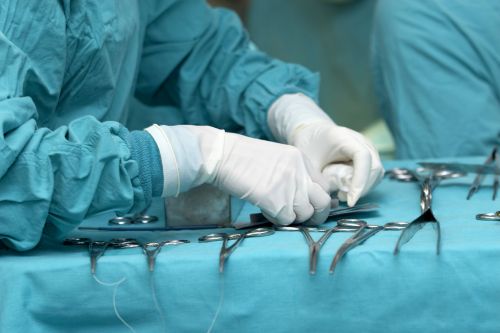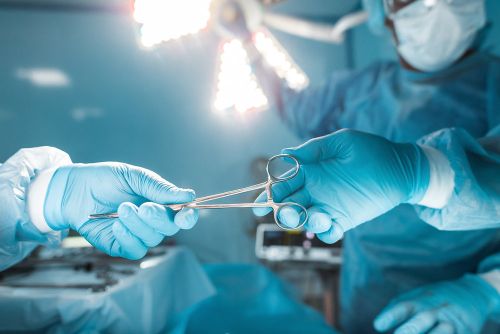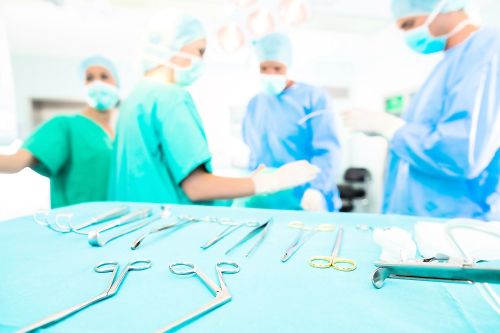It is a surgical procedure performed to treat tears in the anal region. These tears are usually caused by constipation and straining. Anal fissure surgery helps to relax the anal muscles, speeding up the healing process. It is usually performed under local or general anesthesia. After surgery, patients can return to their daily activities within a short period.
When is Anal Fissure Surgery Performed?
 If the anal fissure persists for more than 8-12 weeks and does not heal despite medical treatments (medications, dietary changes, stool softeners, etc.), surgical intervention may be necessary. Chronic fissures usually become deeper and cause pain. Surgical options should be considered if the patient has had recurrent anal fissures. Recurrent fissures can significantly affect the patient's quality of life. Anal fissure surgery may be recommended for patients experiencing severe and persistent pain. Such pain can negatively impact daily activities. Some patients suffer from their fissures long enough to require surgical intervention for healing. If the patient does not achieve healing, surgical options should be evaluated. Sometimes, anal fissure can occur together with other anal diseases (e.g., hemorrhoids, anal abscess). In such cases, surgical intervention may be necessary to improve the overall course of the disease. Anal fissure surgery is usually performed to repair the fissure or relax the anal sphincter muscles. Such an intervention can reduce the patient's symptoms and improve quality of life. The decision for surgery is made by the specialist, considering the patient's condition.
If the anal fissure persists for more than 8-12 weeks and does not heal despite medical treatments (medications, dietary changes, stool softeners, etc.), surgical intervention may be necessary. Chronic fissures usually become deeper and cause pain. Surgical options should be considered if the patient has had recurrent anal fissures. Recurrent fissures can significantly affect the patient's quality of life. Anal fissure surgery may be recommended for patients experiencing severe and persistent pain. Such pain can negatively impact daily activities. Some patients suffer from their fissures long enough to require surgical intervention for healing. If the patient does not achieve healing, surgical options should be evaluated. Sometimes, anal fissure can occur together with other anal diseases (e.g., hemorrhoids, anal abscess). In such cases, surgical intervention may be necessary to improve the overall course of the disease. Anal fissure surgery is usually performed to repair the fissure or relax the anal sphincter muscles. Such an intervention can reduce the patient's symptoms and improve quality of life. The decision for surgery is made by the specialist, considering the patient's condition.
How is Anal Fissure Surgery Performed?
 Before the operation, the patient's overall health status is evaluated. If necessary, laboratory tests and imaging methods can be used. Before the surgery, the patient's bowels are cleaned. The surgery is usually performed under local anesthesia or general anesthesia. The type of anesthesia used depends on the patient's health status and the surgeon's preference. Fissure excision involves cutting and removing the fissure along with surrounding tissues, allowing the wound to be cleaned and healed. Internal sphincterotomy aims to reduce tension by cutting the inner muscles of the anus. This method helps the fissure to heal while also reducing pain. In some patients, fissure treatment can be performed using a laser method. The laser can speed up healing by cutting tissue minimally invasively. After anal fissure surgery, patients are usually kept under observation for a few hours. After discharge, it is important to follow the doctor's recommendations. Drinking plenty of fluids, consuming fiber-rich foods, and avoiding straining during bowel movements can speed up the healing process. After the surgery, the patient's condition is regularly monitored. Follow-up appointments are important to ensure the healing process continues healthily.
Before the operation, the patient's overall health status is evaluated. If necessary, laboratory tests and imaging methods can be used. Before the surgery, the patient's bowels are cleaned. The surgery is usually performed under local anesthesia or general anesthesia. The type of anesthesia used depends on the patient's health status and the surgeon's preference. Fissure excision involves cutting and removing the fissure along with surrounding tissues, allowing the wound to be cleaned and healed. Internal sphincterotomy aims to reduce tension by cutting the inner muscles of the anus. This method helps the fissure to heal while also reducing pain. In some patients, fissure treatment can be performed using a laser method. The laser can speed up healing by cutting tissue minimally invasively. After anal fissure surgery, patients are usually kept under observation for a few hours. After discharge, it is important to follow the doctor's recommendations. Drinking plenty of fluids, consuming fiber-rich foods, and avoiding straining during bowel movements can speed up the healing process. After the surgery, the patient's condition is regularly monitored. Follow-up appointments are important to ensure the healing process continues healthily.
Precautions After Anal Fissure Surgery
 Cleaning the area after surgery is extremely important. It should be gently cleaned after each bowel movement. Hygienic products should be used to reduce the risk of infection. Cleaning with warm water can reduce irritation in the area. Mild to moderate pain after anal fissure surgery is normal. Regular use of painkillers recommended by the doctor helps to control discomfort. If the pain intensifies or becomes unbearable, a doctor should be consulted immediately. A balanced diet plays an important role in the healing process. Consuming fiber-rich foods (vegetables, fruits, whole grains) softens the stool and prevents straining during bowel movements. Drinking adequate amounts of water is also important. Bowel habits may change after surgery. If necessary, the urge to go to the toilet should be waited for, and straining should be avoided. Long periods of sitting or straining can negatively affect healing. It is important to give the body time to heal. Resting helps the body recover. Excessive physical activity should be avoided, and rest periods should be taken care of. Regular doctor check-ups are crucial for tracking the healing process. Early intervention can be provided in case of any problems or complications. Stress can negatively affect the healing process. Relaxation techniques and methods like meditation can help manage stress. Considering these important points after anal fissure surgery will help patients have a faster and more comfortable healing process. If there are any problems or concerns, the doctor should be contacted.
Cleaning the area after surgery is extremely important. It should be gently cleaned after each bowel movement. Hygienic products should be used to reduce the risk of infection. Cleaning with warm water can reduce irritation in the area. Mild to moderate pain after anal fissure surgery is normal. Regular use of painkillers recommended by the doctor helps to control discomfort. If the pain intensifies or becomes unbearable, a doctor should be consulted immediately. A balanced diet plays an important role in the healing process. Consuming fiber-rich foods (vegetables, fruits, whole grains) softens the stool and prevents straining during bowel movements. Drinking adequate amounts of water is also important. Bowel habits may change after surgery. If necessary, the urge to go to the toilet should be waited for, and straining should be avoided. Long periods of sitting or straining can negatively affect healing. It is important to give the body time to heal. Resting helps the body recover. Excessive physical activity should be avoided, and rest periods should be taken care of. Regular doctor check-ups are crucial for tracking the healing process. Early intervention can be provided in case of any problems or complications. Stress can negatively affect the healing process. Relaxation techniques and methods like meditation can help manage stress. Considering these important points after anal fissure surgery will help patients have a faster and more comfortable healing process. If there are any problems or concerns, the doctor should be contacted.


